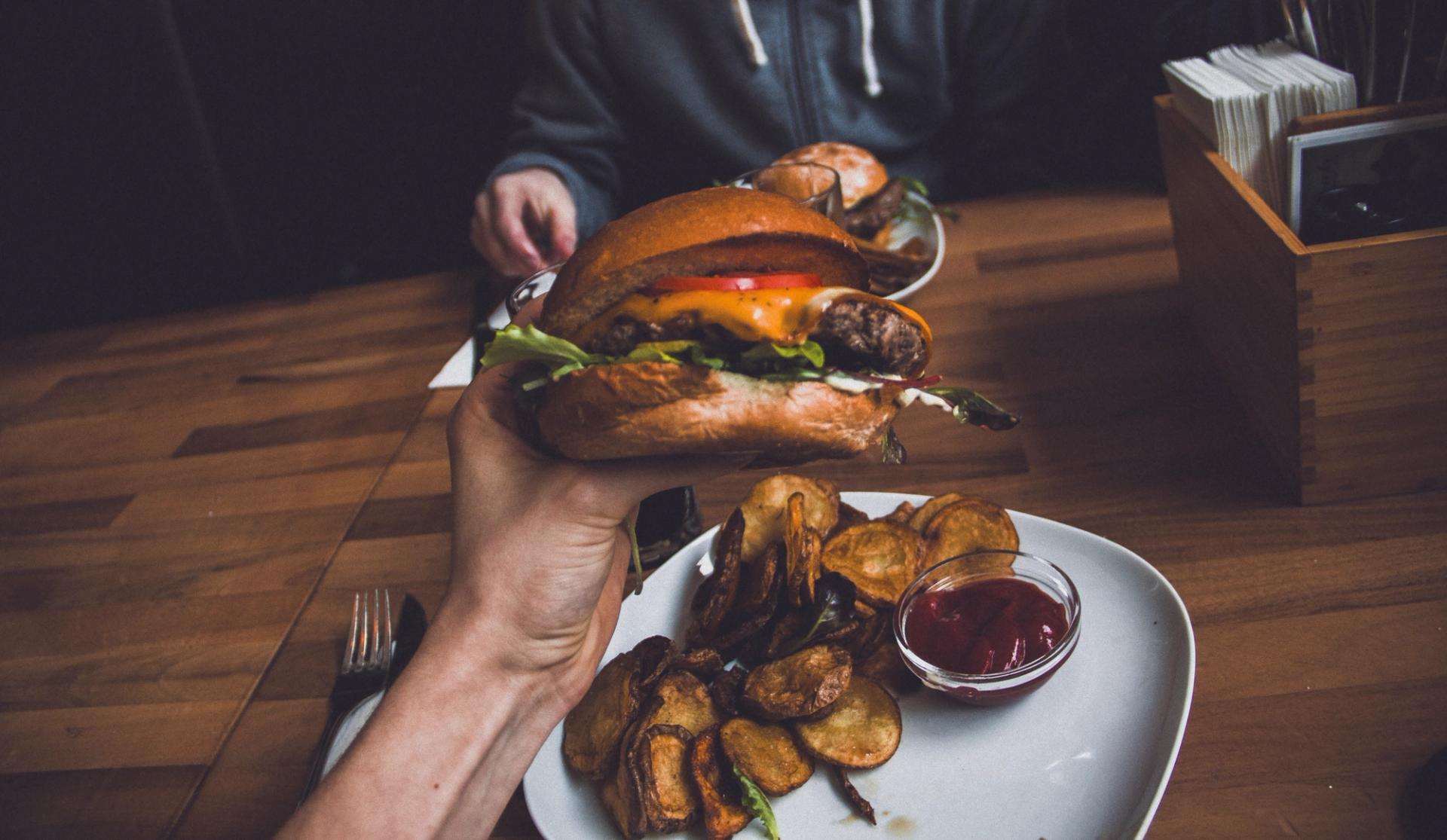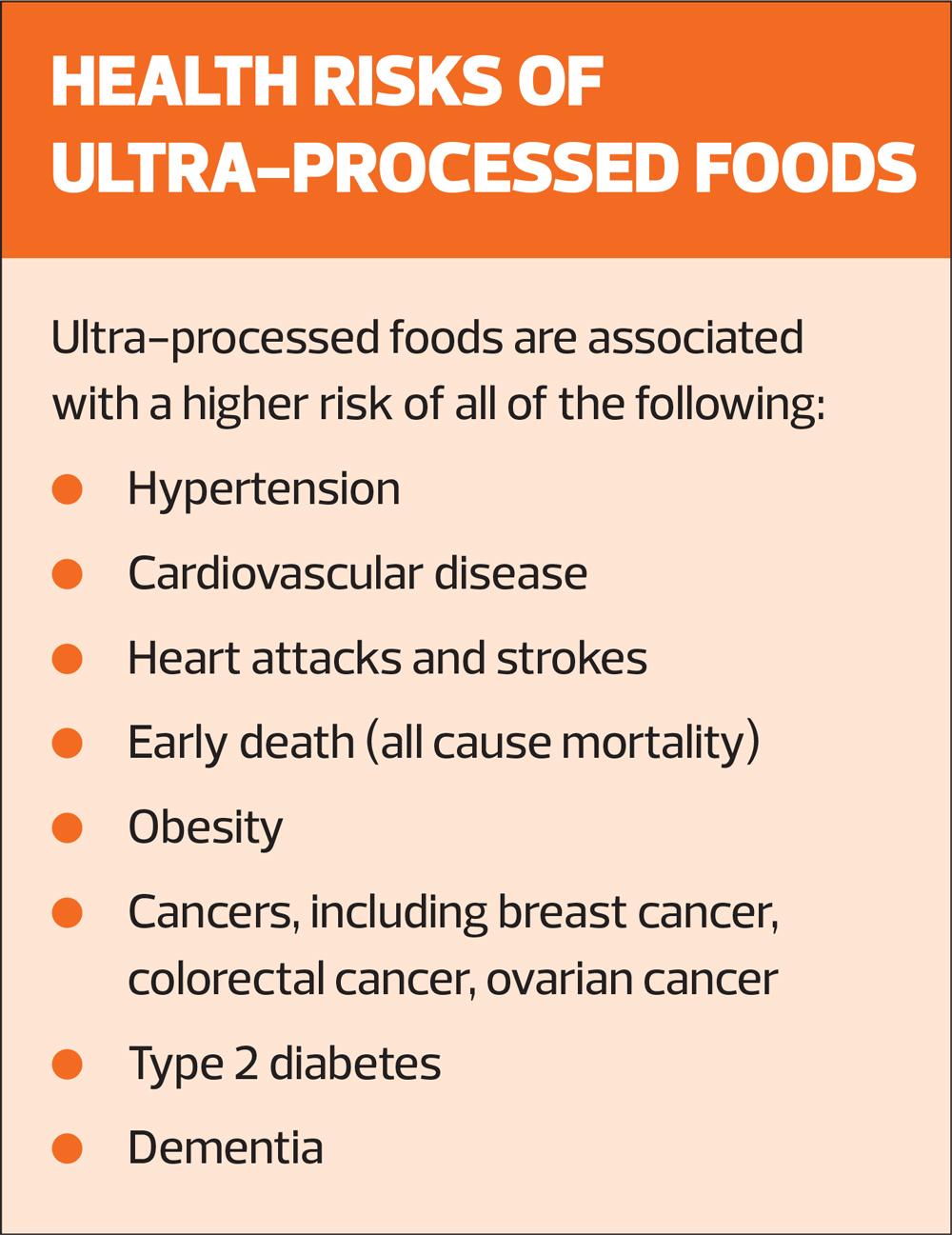
Why practice nurses need to know about ultra-processed foods
Sara Richards
Sara Richards
RGN
Nurse practitioner (retired)
Trainer and supervisor for Bereavement Volunteers,
Cruse Bereavement Support
Practice Nurse 2023;53(5):8-9
Evidence is mounting that ultra-processed foods are contributing to the global obesity epidemic as well as to the rapidly rising number of patients with long term conditions including heart disease and diabetes
Ultra-processed foods or UPFs have been in the news recently because research seems to be showing that they affect our general health, specifically contributing to cardiovascular disease, type 2 diabetes, inflammation and cancer.1,2 There has been a rapid rise in long term conditions over the last decade and researchers are keen to find out why. Could ultra processed food be one cause?
Globally poor diets, i.e. lacking nutrients for growth and health, account for many days lost to ill health and premature death.3 In the UK today, around two-thirds (63%) of adults are above a healthy weight, and of these, half are living with obesity, which is a leading cause of ill health.4 People are eating too many foods high in sugar, salt, and fat rather than following the UK Government guidelines in the Eatwell guide.5
So, what is UPF? In 2009, Monteiro and colleagues at the University of Sao Paulo, Brazil, developed a food classification system of processing called NOVA,6,7 and coined the phrase ‘ultra processed food’ – but many countries have their own systems as well. The NOVA classification is as follows:
Group 1: Unprocessed foods – Fruits and vegetables, grains, meat, fish, and eggs. However, most foods are eventually minimally processed by cooking or pickling.
Group 2: Processed culinary ingredients – Butter, sugar, honey and oils, extracted from nature and added, sparingly, to unprocessed foods to improve their flavour.
Group 3: Processed foods – foods that have been preserved, often using salt or sugar which, with the cooking process, has made food safer and longer lasting for the health of the general population. This category includes homemade jams, pickles, homemade bread, tinned fruit and vegetables, and cheese.
Group 4: Ultra-processed foods – industrially made carbonated drinks, breakfast cereals, fruit-flavoured yoghurts, ice cream, instant meals and crisps, which include additives, emulsifiers, sweeteners and other chemicals which are not ‘foods’ and do not feed the intestinal microbiome.
Exciting research is ongoing about how the intestinal microbiota (the billions of bacteria, fungi and viruses in the gut) affect our whole bodies,8 and how UPFs affect the microbiota.
Critical analysis of the NOVA system is that it is too simplistic and confusing for consumers (and for researchers as it does not describe ‘processing’ or any correlation with diseases).9 However, it does give a simple explanation of processed foods which is a useful starting point in understanding this subject.
UPFs such as snacks, cakes and sweets, are usually cheap, convenient and tasty, and many are calorie-laden but are also thought to be addictive,10 as the industry that makes them has a vested interest in wanting people to buy more, but they have little nutritional value.
Henry Dimbleby,11 in his recent book ‘Ravenous’, says: ‘In systems terms, we have become stuck in a reinforcing feedback loop – a vicious cycle. Let’s call it the Junk Food cycle. We have a predilection for calorie-dense foods, which means food companies invest more time and money creating these foods, which makes us eat more of them and expands the market, which leads to more investment, which makes us eat more’.
There is little harm in eating these foods occasionally and enjoying them, but it is the quantity now being consumed, especially by children, that is worrying.
Urgent action is needed to discourage both adults and children – particularly our children – from eating these UPFs as much as they do, as they appear to be contributing to overweight and obesity and other avoidable diseases such as dyslipidaemia, metabolic syndrome, type 2 diabetes, cardiometabolic diseases, wheezing, depression, frailty, irritable bowel syndrome, functional dyspepsia, cancer (breast and overall) and mortality.12
According to a cross-sectional study in 2018, ultra-processed foods account for 56.8% of total energy intake and 64.7% of total free sugars in the UK diet.13 Free sugars represent 12.4% of total energy intake, and 61.3% of the sample exceeded the recommended limit of 10% energy from free sugars. This percentage was higher among children (74.9%) and adolescents (82.9%). So, a diet of junk food can make you simultaneously overweight and undernourished.
Many people trying to lose weight eat manufactured low-calorie foods and diet drinks but the sugar and fat content of the original food has been replaced with chemicals and sweeteners, making them UPFs, and therefore according to some research, actually encouraging weight gain. Professor Tim Spector,14 a genetic epidemiologist and professor of genetic epidemiology at King’s College London, has spent much of his career researching the role our gut health plays in weight loss. He has written a number of books about this, which are useful to study in conjunction with NHS dietary advice. Spector argues for a diet that increases gut microbe diversity: in particular increasing fibre content using a Mediterranean-style diet with plenty of nuts, grains, vegetables and fresh foods, while avoiding junk and processed foods and fad diets.
There have also been several TV programmes about the dangers of UPFs including a BBC One Panorama episode titled ‘UPF, a recipe for ill health’, broadcast on 5 June 2023 and available on BBC iPlayer.15
A report from the First Steps Nutrition Trust gives seven recommendations for reducing the consumption of UPFs in children to prevent obesity and early diabetes,16 and the Access to Nutrition Initiative (ATNI)17 is attempting to transform markets so that at least half of companies’ food and beverage sales are derived from healthy products by 2030. The Secretary of State for Health and Social Care said in March 2023 that ‘UK Government dietary guidelines are based on recommendations from the Scientific Advisory Committee on Nutrition (SACN). SACN is currently carrying out a scoping review of the evidence on processed foods and health and aims to publish its initial assessment in the summer of 2023.’18
Why is it important that general practice nurses know about UPFs?
GPNs (together with GPs) are in the privileged position of seeing people throughout their lives, and during any consultation or procedure they carry out, they are able to talk about lifestyle – which includes diet. The more information about the latest research and thinking they acquire, the more they will be able to discuss the dangers of UPFs and advise people on how to keep as well as possible by eating minimally processed foods. The cost of living is always a consideration, but advice can be tailored to the circumstances of the people in the nurse’s care.
CONCLUSION
Some of the statistics cited in the references are frightening so it is good to know that there are some initiatives taking place to limit the availability of UPFs, reduce ultra processing and help people to understand the dangers of UPFs but it needs healthcare professionals and the Government to implement the recommendations (when published) before the NHS is overwhelmed by ageing people with preventable long term conditions.
REFERENCES
1. Ultra-processed food News, Research and Analysis. The Conversation; 2023 https://theconversation.com/uk/topics/ultra-processed-food-49954
2. Cartwright J. Ultra-processed foods linked to cancer, diabetes, and heart disease; 2023 https://thethaiger.com/news/world/uk/ultra-processed-foods-linked-to-cancer-diabetes-and-heart-disease
3. Science Daily. Globally, one in five deaths are associated with poor diet; 2019 https://www.sciencedaily.com/releases/2019/04/190403193702.htm
4. Department of Health and Social Care. Tackling obesity: empowering adults and children to live healthier lives; 2020 https://www.gov.uk/government/publications/tackling-obesity-government-strategy/tackling-obesity-empowering-adults-and-children-to-live-healthier-lives
5. Public Health England. Eatwell Guide; 2016 https://assets.publishing.service.gov.uk/government/uploads/system/uploads/attachment_data/file/528193/Eatwell_guide_colour.pdf
6. Monteiro C, Cannon G, Lawrence M, et al. Ultra-processed foods, diet quality, and health using the NOVA classification system. Food and Agricultural Organization of the United Nations; 2019 https://www.fao.org/3/ca5644en/ca5644en.pdf#:~:text=The%20NOVA%20classification%20system%20groups%20all%20foods%20according
7. Fiolet T, Srour B, Sellem L, et al. Consumption of ultra-processed foods and cancer risk: results from NutriNet-Santé prospective cohort. BMJ 2018;360:k322 https://www.bmj.com/content/360/bmj.k322
8. University of North Carolina Global Food Research Program. UPFs Fact Sheet; 2021 https://globalfoodresearchprogram.org/wp-content/uploads/2021/04/UPF_ultra-processed_food_fact_sheet.pdf
9. FoodDrinkEurope. Scientific critique of “ultra-processed foods” classifications; January 2023 https://www.fooddrinkeurope.eu/wp-content/uploads/2023/01/Scientific-critique-of-ultra-processed-foods-classifications-.pdf
10. Filgueiras AR, Pires de Almeida VB, et al. Exploring the consumption of ultra-processed foods and its association with food addiction in overweight children. Appetite 2019;135:137–45. https://www.sciencedirect.com/science/article/abs/pii/S0195666318310985
11. Dimbleby H, Lewis J. Ravenous. Profile Books; 2023
12. Imperial College London. Urgent action needed to reduce harm of ultra-processed foods to British children; 2021 https://www.imperial.ac.uk/news/223573/urgent-action-needed-reduce-harm-ultra-processed/
13. Rauber F, Louzada ML da C, Martinez Steele E, et al. Ultra-processed foods and excessive free sugar intake in the UK: a nationally representative cross-sectional study. BMJ Open 2019;9(10):e027546. https://bmjopen.bmj.com/content/9/10/e027546
14. Tim Spector Books: https://tim-spector.co.uk/tim-spector-books/
15. BBC. Panorama. Ultra-Processed Food: A Recipe for Ill Health?;2023 https://www.bbc.co.uk/iplayer/episode/m001mp67/panorama-ultraprocessed-food-a-recipe-for-ill-health
16. First Steps Nutrition Trust. Ultra-processed foods marketed for infants and young children in the UK; 2023 https://www.firststepsnutrition.org/upfs-marketed-for-infants-and-young-children
17. Access to Nutrition Initiative. The Initiative. https://accesstonutrition.org/the-foundation/
18. Question for Department of Health and Social Care. https://questions-statements.parliament.uk/written-questions/detail/2023-03-13/163766.2923
Related articles
View all Articles
